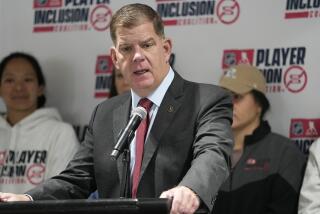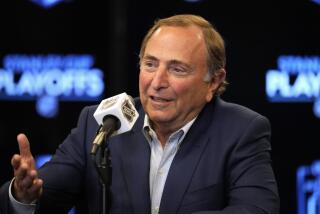NHL Season Won’t Start Without Deal : Hockey: Management does not want to play unless collective bargaining agreement is reached.
The NHL’s 78th season will not start as scheduled on Oct. 1 unless the league and its players can come to a collective bargaining agreement, Commissioner Gary Bettman said Thursday.
Although Bettman repeatedly said his edict does not constitute a lockout, the effect is the same. It would delay--and possibly taint if games are canceled--a season in which the NHL is to get its widest television exposure and hockey’s popularity promises to continue its recent surge.
“In light of the current status of negotiations, in light of the experience in major league baseball and in light of this league’s experience two years ago (with a 10-day strike before the playoffs), the NHL is not prepared to open a season that is subject to the risk of being lost prior to its completion,” Bettman said, referring to the strike that halted baseball in August and last week led to the cancellation of the rest of the season.
“We believe the prudent course of action is to put things on hold and continue to try and make a deal. When one is reached, we will be in a position to put all this behind us and have a full season . . . with playoffs and without distraction and most importantly, without the risk of interruption.”
Reaching an accord in the next eight days “would be difficult and arduous but not impossible,” Bettman said. He added that he told players that benefits he took away from them before camp opened would be retroactively restored should they agree to a deal by Oct. 1. Those benefits include payment of medical premiums for players who earn less than $350,000 annually, expense money and transportation to training camp. Players will not be paid if the season is delayed.
Bettman and Bob Goodenow, executive director of the NHL Players Assn., met four times in the last week without making appreciable progress. They are not scheduled to talk again until Monday, after Goodenow completes a tour of camps.
“We’re at the North Pole, they’re at the South Pole,” Mighty Duck forward Stu Grimson said. “Someone’s going to have to be hurt financially before someone’s willing to cave in on their position. That’s how far apart we are. That’s how far apart they are in baseball. Every day people are losing money, it’s just a question of who’s going to stop the bleeding.”
Bettman’s move was a preemptive strike against a walkout by players after the season began.
“All you have to do is read the tea leaves,” Bettman said of the likelihood of a strike. “There’s no question the players’ leverage increases with each day of the season.”
Goodenow called the announcement a pressure play that jeopardizes the start of the season.
“A lockout or postponement will not affect players in negotiations,” he said. “The league wants to exert a different sort of pressure and that certainly is within their prerogative, but we have to take a very measured approach.”
Remaining exhibition games will be played as scheduled. However, should the dispute stretch more than a week into the season, games may be canceled and clubs would have to determine how to compensate fans who have bought tickets. Bettman said training camps would remain open after Oct. 1 for players to voluntarily report.
Issues such as arbitration, free agency and a salary scale for players in their first three seasons have been at the forefront throughout talks. The key difference, however, is how each side proposes to bring small-market clubs onto equal footing with clubs that have greater sources of revenue.
The NHL’s plan focuses on salaries by setting a limit on club payrolls and taxing clubs that exceed that limit. The “fines” would be redistributed to small-market clubs. A minimum payroll would be established to force teams that have spent little on player salaries to spend more freely, theoretically resulting in the acquisition of better players who would make them more competitive.
Players see that as a means of depressing salaries and restricting movement because the fines might be as much as 200% of the salary of the player a club signs. They also say it makes them pay for management’s fiscal mistakes.
“They have a salary cap; it’s called an internal budget,” said King defenseman Marty McSorley, a member of the NHLPA’s negotiating committee.
“There certainly will not be a salary cap. I can emphatically say not. It’s not good for the game. I look at baseball and it’s really curious to me. You can’t argue with the fact that a lot of teams are making a lot of money. Why go back to the players and say, ‘There are teams not making money and you have to help us.’ Why can’t they fix that (internally)? Nobody held a gun to anybody’s head to sign Bobby Bonilla.”
The players’ proposal called for a 5% tax on revenues of all clubs, with the proceeds being distributed to the less affluent clubs. League officials doubt that would raise enough money to serve its stated purpose.
Players have said that if talks continued, they would play under the last collective bargaining agreement, which expired a year ago. However, that was rejected by club executives, whom Bettman said unanimously backed his actions when he addressed them by conference call Wednesday.
Duck President Tony Tavares said, “I think a postponement is saying to the players association specifically, ‘Hey guys, we tried to get this thing done. We don’t have any time left.’ This impasse has placed us in a position where we can’t start on time. So this is probably a step just before something more drastic.
“I think Gary’s absolutely accurate in what he’s said, (that) for every game that gets played, the leverage ends up going completely over into the players’ favor. They’ve already said they’ll play under the existing contract. I don’t think the owners have any specific interest in doing that right now. There are deep problems in this league that have to be resolved.”
Said Bettman: “This league needs a new system and a new foundation to go forward. Our objective is the stability and growth of this league for the benefit of everyone associated with it. Our goal is to make a deal. With the developments of the last year (a TV deal with Fox and sponsorship by Nike and Anheuser-Busch) the time couldn’t be better for this sport to have a deal. And the time couldn’t be worse not to.”
Times staff writers Lisa Dillman and Robyn Norwood contributed to this story.
More to Read
Go beyond the scoreboard
Get the latest on L.A.'s teams in the daily Sports Report newsletter.
You may occasionally receive promotional content from the Los Angeles Times.







